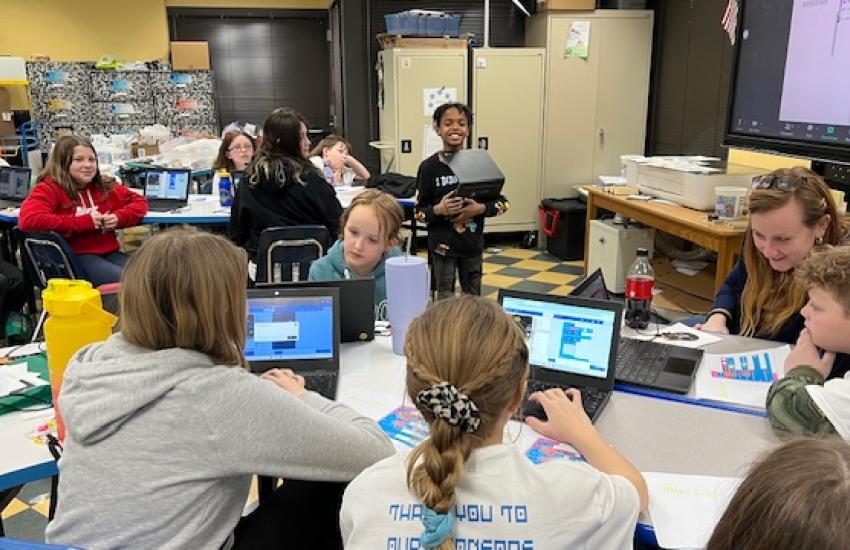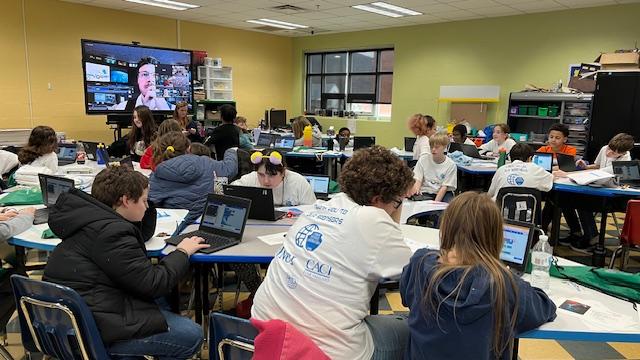Are You Smarter Than a Fifth Grader? Probably Not
Laptop: check! Microbit device: check! Mission envelopes: check! Potential to one day protect the nation against cyber threats: check!
It was Friday, March 1, when students from eight schools tuned into a live Zoom call to participate in the third annual Code-A-Thon, organized and executed entirely by AFCEA volunteers.
“Hello, Virginia coders! I am Lt. Ryan Quarry, coding commander here at the Virginia AFCEA Space Alliance—just call us VASA!” Lt. Quarry, dressed in space-mission-ready uniform, addressed the students and kicked off the event.
While VASA and the Green Mission scenario “Grow the Planet” are fictitious, students excitedly took on their roles as mission specialists to undertake coding challenges and save the day!
“You are now supporting VASA’s Green Mission to Planet X Voyager 1 Colony, where just last year we discovered possible evidence of life,” said Tom Perry, president and CEO at VG Systems LLC—and the VASA Mission Director. “For this mission, we are virtually supporting a select group of astronaut colonists who are going to set up the first sustainable community off-world from Earth!”
Fully immersed in this fictitious world, the students listened carefully to complete eight challenges, each focused on crucial science, technology, engineering and mathematics (STEM) topics. The event was also created in alignment with the Virginia Standards of Learning (SOL) assessment program.
The first challenge was about preparing a successful spaceship landing on Planet X, which required students to use math measurements and geometry to complete a block code. Other challenges helped students learn about visible light characteristics, the basic structure of Earth, space system interrelationship, data collection and ethical impacts related to computing devices and networks.
Upon presenting each challenge, Perry invited students—or mission specialists—to present their solutions and findings to the rest of the audience.
With smiles on their faces and excitement building in their eyes, the students approached their classroom cameras one by one to talk Perry through their code and the logic they used to achieve the mission.
“One kid literally was dancing with joy after he presented,” shared Brendan Burke, executive vice president of the AFCEA Belvoir Chapter.

This event, which has grown from just two participating schools in its first year, is the only one of its kind, explained Jeff Thompson, president of the AFCEA Rockbridge Shenandoah Chapter. “It is the only Code-A-Thon event held virtually that has collaboration from different school systems, Department of Defense (DoD), DoD Education Activity grant schools and public schools with the aim of introducing coding, promoting science, technology, engineering, art and mathematics (STEAM) skills and an appreciation of cyber awareness and security,” he told SIGNAL Media.
"We are supported by various AFCEA chapter and organizations around the Commonwealth," Thompson explained. While the AFCEA Belvoir Chapter handles operations, marketing and logistics, AFCEA's Rockbridge Chapter handles script-writing with coding challenges, challenge cards and trivia question databases. Additionally, AFCEA Quantico, AFCEA Central Virginia and the New College Institute (NCI) sponsor local elementary schools in their areas.
With weekly meetings for the past six months, countless emails, script writing and rehearsals, Thompson and his team of AFCEA volunteers invested personal time simply due to their belief in empowering the next generation and preparing them for their future roles.
“From brainstorming technical challenges to collaborating with the script team to develop an engaging storyline, every aspect of this year’s Code-A-Thon was a testament to our collective commitment to fostering creativity and innovation in our youth,” Perry shared in a LinkedIn post.
For the Patrick Henry Elementary School in Martinsville, Virginia, this was the first time students got the opportunity to join the mission. The creative aspect of the event helped some students who sometimes struggle to find motivation in the classroom to become engaged and excited to participate, said Susheela Shanta, chief academic officer at the New College Institute. “One fifth-grade student said she had never imagined that she could do such a thing and that she could show her skills to others in a public setting,” she shared. “It provided students with a confidence boost.”
The nearly three-hour event focused entirely on our future innovators was certainly a success, and we at AFCEA International thank each teacher, volunteer and sponsor who helped complete this mission. We look forward to the next!





Comments